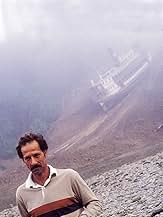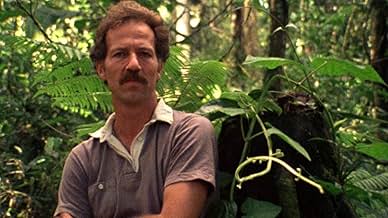Documental sobre el cineasta alemán Werner Herzog, que se enfrenta a actores difíciles, al mal tiempo y a la necesidad de atravesar una montaña en barco para rodar su película Fitzcarraldo (... Leer todoDocumental sobre el cineasta alemán Werner Herzog, que se enfrenta a actores difíciles, al mal tiempo y a la necesidad de atravesar una montaña en barco para rodar su película Fitzcarraldo (1982).Documental sobre el cineasta alemán Werner Herzog, que se enfrenta a actores difíciles, al mal tiempo y a la necesidad de atravesar una montaña en barco para rodar su película Fitzcarraldo (1982).
- Ganó 1 premio BAFTA
- 4 premios y 1 nominación en total
- Self
- (as Alfredo de Rio Tambo)
- Self
- (as Angela Reine)
- Self
- (as Elia de Rio Ene)
- Self
- (as David Perez Espinosa)
- Self
- (as Miguel Angel Fuentes)
- Self
- (as Father Mariano Gagnon)
- Self
- (as Huerequeque Bohoroquez)
Argumento
¿Sabías que...?
- CuriosidadesThroughout production, Les Blank and his small crew became exhausted and exasperated from the stress of the work. Blank said that he felt "unconnected" to the people around him. Keeping up with the antics of Werner Herzog and Klaus Kinski proved difficult for the reserved, introverted Blank. By the last week of production, he was so burnt out that he feared coming out of production "like some Viet Nam veterans, horribly calloused". He wrote in his journal, "I'm tired of it all and I couldn't care less if they move the stupid ship - or finish the fucking film".
- Citas
Werner Herzog: [On the jungle] Kinski always says it's full of erotic elements. I don't see it so much erotic. I see it more full of obscenity. It's just - Nature here is vile and base. I wouldn't see anything erotical here. I would see fornication and asphyxiation and choking and fighting for survival and... growing and... just rotting away. Of course, there's a lot of misery. But it is the same misery that is all around us. The trees here are in misery, and the birds are in misery. I don't think they - they sing. They just screech in pain. It's an unfinished country. It's still prehistorical. The only thing that is lacking is - is the dinosaurs here. It's like a curse weighing on an entire landscape. And whoever... goes too deep into this has his share of this curse. So we are cursed with what we are doing here. It's a land that God, if he exists has - has created in anger. It's the only land where - where creation is unfinished yet. Taking a close look at - at what's around us there - there is some sort of a harmony. It is the harmony of... overwhelming and collective murder. And we in comparison to the articulate vileness and baseness and obscenity of all this jungle - Uh, we in comparison to that enormous articulation - we only sound and look like badly pronounced and half-finished sentences out of a stupid suburban... novel... a cheap novel. We have to become humble in front of this overwhelming misery and overwhelming fornication... overwhelming growth and overwhelming lack of order. Even the - the stars up here in the - in the sky look like a mess. There is no harmony in the universe. We have to get acquainted to this idea that there is no real harmony as we have conceived it. But when I say this, I say this all full of admiration for the jungle. It is not that I hate it, I love it. I love it very much. But I love it against my better judgment.
Unfortunately, it did not reveal much about Fitzcarraldo. I had read about the problems Herzog had during the filming, and this is basically what Burden's focus is. The documentary does not go deep enough, though. I would say about a quarter of it (its running length is just over 90 minutes) is made up of actual scenes from Fitzcarraldo with maybe a short paragraph to describe the setting and maybe some small bit of behind-the-scene narrative.
Another section of the film is made up of interviews with the cast and crew. This should have been the lifeblood of this documentary, but it was not. Herzog's own interviews were interesting, but it is more or less him complaining because things are not going his way (which he has a right to complain about, but it isn't all that interesting to watch). He has this very silly monologue where he complains about how the jungle symbolizes the death of the world, when really the only thing symbolizing death is his dying film. Very disappointing is the documentarians' inability to get interviews with the cast. I was seriously hoping for some of Klaus Kinski's patented insanity and also at least one interview with the great Claudia Cardinale. There was one tiny interview with Kinski where he complained about having cabin fever for being stuck in the cast camps for weeks at a time, completely justifiable, I would say, and there are no interviews with Cardinale (although she may have been interviewed before I started watching). It made me feel a little disappointed that no documentarians had been there to film Aguirre, the Wrath of God, where Kinski absolutely flipped out!
Never fear, though. There is one very good part of this film: it serves as an ethnographic document for the Indians of South America. Herzog rightly claims that their parts in Fitzcarraldo itself were not sufficiently ethnographic, since they were just doing what he was asking of them. But in the documentary, we see the Indians making masato, an alcoholic drink made of yucca and saliva, we see them playing games such as arrow catching, we even see an attack from a different tribe that believes that the Indians who are working on the film have come to attack them. All of this is extremely interesting. 7/10
- zetes
- 8 mar 2001
- Enlace permanente
Selecciones populares
- How long is Burden of Dreams?Con tecnología de Alexa
Detalles
- Fecha de lanzamiento
- Países de origen
- Idiomas
- Títulos en diferentes países
- Pelicula o muerte
- Localizaciones del rodaje
- Empresas productoras
- Ver más compañías en los créditos en IMDbPro
Contribuir a esta página






























